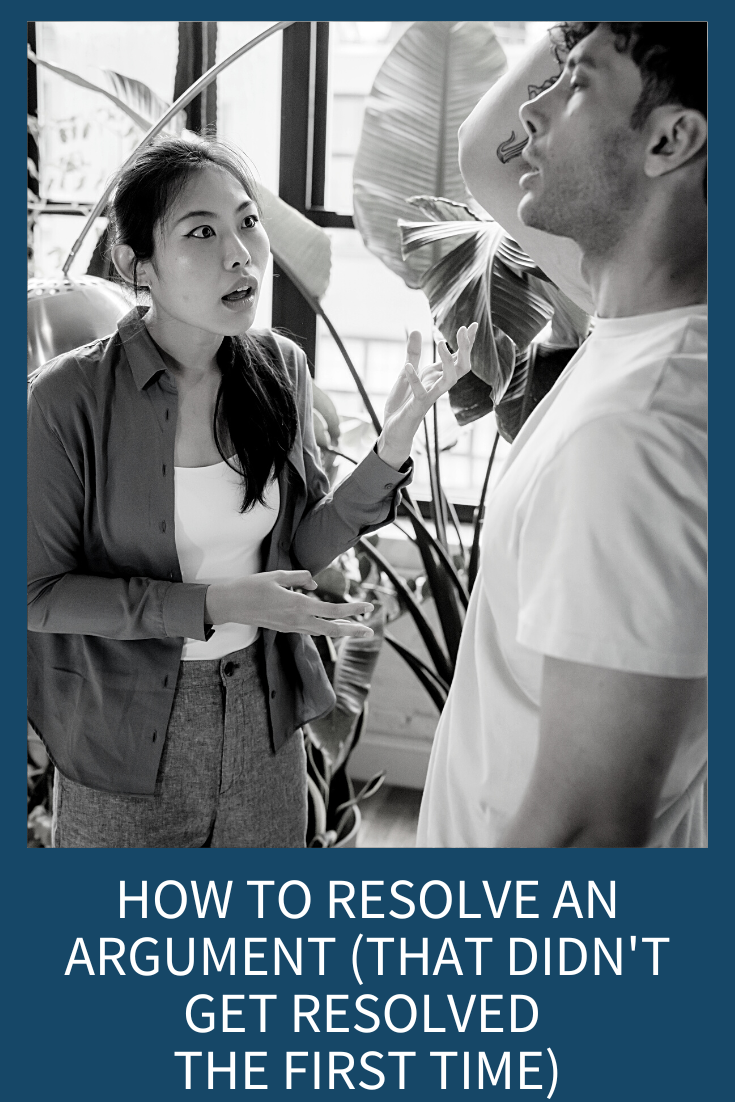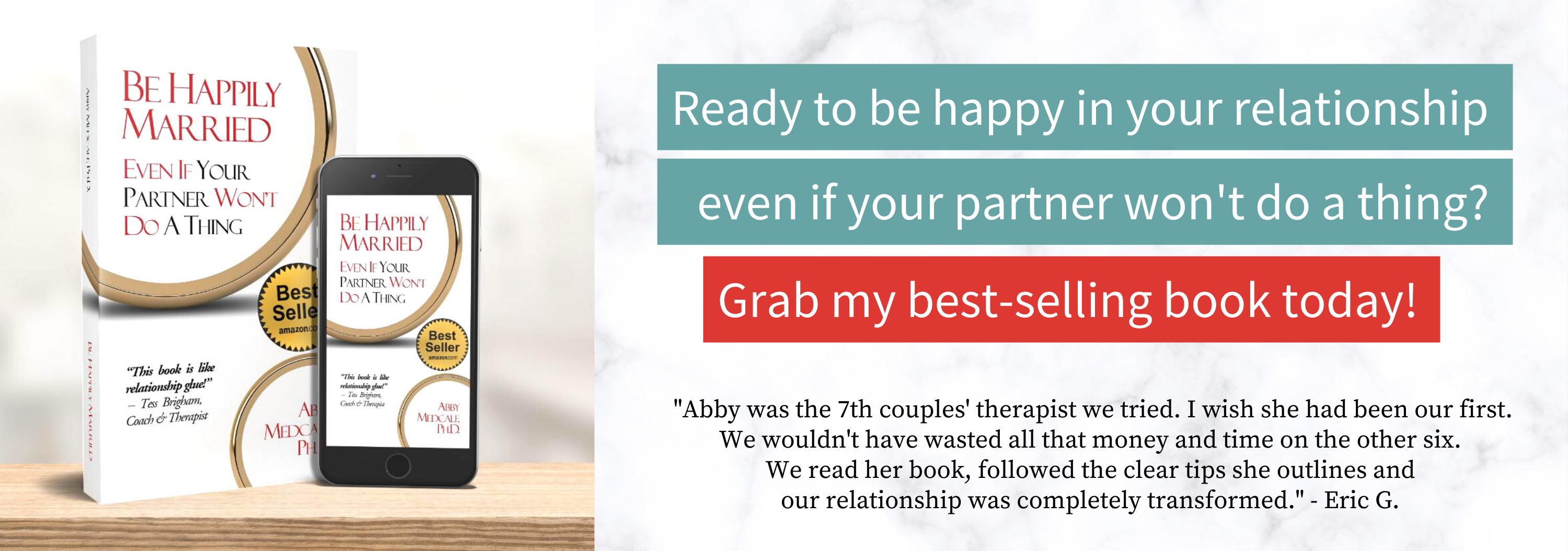
You’ve had the argument, and the dust has settled but no one’s feeling better (at least not you) because you never actually came to any agreement about what you were fighting about! You want to find a way to finish this conversation without it turning into a fight again, but how? Today you’ll learn my easy four-step process to resolving that argument once and for all.
8-minute read
I’ve previously taught how to discuss relationship problems without it turning into a fight and how to stop having the same fight over and over again. That would be great to check out, but in today’s teaching, I’m bringing you a fresh perspective to add to all you might have learned before.
When we’ve argued with someone and don’t feel like we were heard or that the problem was solved, it’s natural to want to jump back in and try to have the conversation again. However, many times, these second conversations start off OK, but before too long, you’re back in that same argument and now you’re even more frustrated and angry! If you’re ready to get off the disagreement merry-go-round, follow these steps.
Step One: Ask Yourself Some Questions
Before you speak to the person you were fighting with, it’s time to speak to yourself first. It’s time for you to get clear on what you’re trying to accomplish in speaking about this issue with them again so you can set yourself up for success. Answering these questions will get you on the right track:
- What am I feeling right now? (If it’s a fear-based emotion, it’s not the right time to try to process anything).
- Can I speak to this person without getting back into the argument?
- Is my goal to convince or persuade the other person to my way of thinking?
- Am I curious about what the other person is thinking?
- Am I willing to see that the other person’s feelings are legitimate? Can I listen without getting defensive or hurt? Can I listen like I’m wrong?
These questions will help you look at your internal motivations in a new way. Just asking them will help you form a new perspective and take a different approach with the other person.
Want to feel happier and more connected in your relationship? Buy my #1 bestselling book on Amazon, Be Happily Married: Even If Your Partner Won’t Do a Thing.
Step Two: Why This?
You’ve looked at your internal motivations for having this next conversation, and now it’s time to answer, “Why did this conversation turn into an argument at all?” Figuring out the answer to this question is huge. This is where you dissect what happened a bit and break it down with some root cause analysis. Why did this turn into a fight to begin with?
- Did you broach something with the other person when they weren’t ready?
- Did they ask you something in what you took as an accusatory tone?
- Did you feel triggered by a particular word they used?
- Did you feel rushed to make a decision and lash out?
- Was the other person in a bad mood when you approached them, but you pushed forward anyway?
- Was one of you under the influence of anything?
- Were you already in a bad place with this person, and this conversation was the straw that broke the camel’s back?
- Did the other person say you always did something or never did something else, and you got defensive?
Take some time to sit and really think about when the conversation turned from a dialogue into an argument. Try and identify three things you could have done better or mistakes you made before or during the fight.
Step Three: Identify the Triggers
If you had a fight, then one or both of you got triggered somewhere along the way. When you’re triggered, it’s generally happening below your conscious level of thinking. You don’t think; you just “do.” When you’re triggered, you lose your ability to think something through, problem solve or make a thoughtful decision. This leads to falling into the same negative patterns and arguments over and over again. Everyone’s got triggers. The goal is to be able to identify when you’re triggered so you can act, not react.
Each person figuring out and taking responsibility for their triggers is a great next step, but you want to stay away from using the word “trigger,” especially when it comes to the other person. You’re not here to diagnose anyone else. Yes, them losing their shit and storming out of the house clearly means they were triggered, but do you want to be correct or effective? When you tell the other person, “You were triggered,” they’ll likely get defensive (unless they’re very comfortable with that word). Instead, you can simply ask, “I’d like to know what upset you specifically.” And then let them tell you.
Ask collaborative questions to find out where exactly the conversation went left for them. For example, they might say, “I got upset when you started criticizing me!” You’ll likely want to jump in and defend yourself at that point. I mean, you’ve been listening to my podcast for months, and you’re very clear that you didn’t criticize at all! So, this is where you’ve got to dig deeper to help them figure out their trigger. Instead of telling them they’re wrong, ask a question. “Can you tell me what I said that felt like I was being critical? I want to understand what happened.”
You’re going to need to be VERY curious here. You’ve got to go in not trying to prove yourself right and instead try to understand. I always say go in trying to learn something, not prove something!
Once you’ve identified any trigger together (aka the point where they became very upset), your next step is to validate their feelings. It doesn’t mean they were right. It means you respect their right to their feelings. Identifying the specific words, actions, and tone of what triggers the other person (and yourself) is a crucial step to resolving this issue for real.
Step Four: Solve It
So many fights happen repeatedly because they never get truly solved. You’re constantly arguing with Jane from Accounting because she never gets you the numbers you need on time. You cajole or get angry, and she gets a little better for a while, but before you know it, she’s late again, and you can’t get your work done. If you have the same argument more than once in a six-month period, it’s time to stop and re-think a real solution. Maybe there’s a way to have someone else in the department get you the numbers you need. Maybe you can get the numbers yourself somehow. Maybe you can get a new job, or maybe you can get coaching for Jane.
If you’re constantly arguing with your partner because he keeps forgetting to put the dishes away at night (so you have a clean kitchen in the morning when you’re getting the kids ready for school), it’s time to solve the issue differently. Maybe you hire someone to come in and clean your kitchen every night. Maybe you have your partner get the kids ready in the morning. Maybe you make the kids put away the dishes. Maybe you have your partner take over a different job, and you put the dishes away. There are always many solutions to a problem, and none of them involve you being a victim.
Overall Rules to Follow:
Rule 1: Focus on the What, not the Who
Focus on what you’re fighting about and not the person you’re fighting with. This means:
- Talk about here and now, not last week, not last year. Stick to this one issue, and don’t let it bleed into other problem areas. One thing at a time.
- Don’t use always or never language.
- Don’t use “you” language.
- No name calling or diagnosing (“You’re mean; you’re depressed; you’re X.”)
Rule 2: Be Curious and Be Solution-Based
I say this a lot. You’ve got to be curious in any fight. Don’t go in with your mind made up. Think of it as brainstorming. If things have escalated to this point, it means it’s something that hits very deep for both of you. Take a moment and be curious with yourself and the other person. You’ve got to find the space to listen like you’re wrong. Set an intention to find a resolution together. Not of compromise but of a new solution you haven’t even conceived of yet (because it needs to come from both of you).
Rule 3: Apologize for Real
Apologies, when done right, have an almost magical power. Not only can they defuse and neutralize anger, resentment, and a full head-of-steam in an instant, they also create an immediate emotional connection where there was animosity and hurt just a moment before.
An apology can’t undo some hurtful thing you said or did in the past, but when done right, it can cancel out the negative effects of those actions and move your relationship forward. And get this, research shows that an apology actually affects the person receiving it physically. Their blood pressure decreases, and their breathing becomes steadier as their heart rate slows. This is huge because it means that your apology will turn off the other person’s fight/flight/or freeze brain and turn on their compassionate, loving brain. There are six steps to apologizing for real that I cover in another episode, so if you haven’t checked it out yet, it’s time!
As a last note, learn to have more empathy and you’ll find that not only do fights become less frequent and harsh, but your relationships become closer and more connected. No matter what else, do your best to keep compassion, patience, and kindness at the top of your list.
Resources for Resolving an Argument
Amazon #1 bestselling book, Be Happily Married: Even If Your Partner Won’t Do a Thing
Abby’s Free List of Collaborative Questions
How to Discuss Relationship Problems with Your Partner Without Turning It into a Fight
How to Stop Having the Same Fight Over and Over Again in Your Relationships
How to Listen Without Getting Defensive or Hurt
How to Apologize for Real and Why It’s So Hard
Empathy in Relationships is the Key to Connection and Communication







